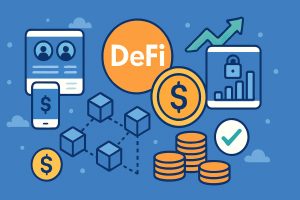
Financial independence no longer relies on traditional banks or intermediaries. Blockchain technology has redefined the way people store, transfer, and manage their wealth. Decentralized finance (DeFi), cryptocurrency, and smart contracts have created a financial system where users have full control over their assets without restrictions imposed by centralized institutions.
Self-Custody: Holding Assets Without a Bank
Traditional banking requires trust in institutions to safeguard funds. Blockchain eliminates that need by giving users full custody of their assets. With private keys, individuals can store digital currencies in non-custodial wallets, ensuring their funds are secure and accessible only to them.
Key benefits of self-custody:
- No risk of bank failures or restrictions on withdrawals.
- No intermediaries controlling access to funds.
- Transactions occur directly between users, reducing costs.
Unlike bank accounts, which can be frozen or restricted, cryptocurrencies remain accessible at any time. Users maintain full ownership without requiring approval from an institution.
Decentralized Finance (DeFi): Banking Without Banks
DeFi platforms replicate traditional financial services such as lending, borrowing, and earning interest, but without the need for centralized entities. Smart contracts replace intermediaries, ensuring transparency and automation.
How DeFi is Shaping Financial Independence:
- Peer-to-peer lending allows users to earn interest without relying on banks.
- Decentralized exchanges (DEXs) enable direct asset swaps without third parties.
- Yield farming and staking provide opportunities to generate passive income.
- Borderless transactions remove geographical restrictions on financial services.
With DeFi, users are no longer limited by banking hours, high fees, or approval processes. Financial inclusion is expanding, providing access to capital and investment opportunities for anyone with an internet connection.
Security and Transparency: No More Hidden Fees
Blockchain records transactions on a distributed ledger, ensuring transparency. Unlike traditional banks that charge hidden fees, blockchain transactions are visible and verifiable by anyone.
How blockchain improves financial transparency:
- Every transaction is recorded permanently.
- Users can track payments without relying on third parties.
- No risk of fund mismanagement or fraudulent banking practices.
This level of transparency prevents unauthorized changes to financial records, ensuring that funds are handled as intended.
Cross-Border Transactions Without Banking Restrictions
Sending money internationally through banks is slow and expensive due to currency conversions and intermediary fees. Blockchain enables direct cross-border transactions with minimal costs.
Advantages of blockchain-based transactions:
- Instant global transfers.
- Lower fees compared to traditional banking systems.
- No intermediaries slowing down transactions.
Cryptocurrencies enable financial access in regions with limited banking infrastructure. Users can send and receive funds without needing approval from centralized institutions.
Inflation Protection and Wealth Preservation
Traditional currencies are subject to inflation, reducing purchasing power over time. Many cryptocurrencies, like Bitcoin, have fixed supplies, making them a hedge against inflation.
Why blockchain-based assets protect wealth:
- Fixed or deflationary supply prevents currency devaluation.
- Decentralized nature reduces government intervention.
- Accessible worldwide without exchange rate risks.
People in countries with volatile currencies are turning to digital assets as a store of value, protecting their savings from economic instability.
Crypto to Fiat Conversion: Checking Asset Value
Tracking the value of digital assets is straightforward with tools like the Crypto to Fiat calculator. This allows users to see real-time conversions between cryptocurrencies and traditional currencies, ensuring informed financial decisions.
Smart Contracts: Automating Transactions Without Trust Issues
Smart contracts execute agreements automatically when predefined conditions are met. Unlike traditional contracts that require intermediaries, blockchain-based contracts operate without manual intervention.
Common uses of smart contracts:
- Escrow services for secure transactions without third-party involvement.
- Automated payments for freelancers and businesses.
- Tokenized assets representing real-world investments.
Smart contracts reduce reliance on banks and legal systems, offering efficiency and security in financial agreements.
Financial Freedom Without Credit Scores
Traditional financial systems rely on credit scores to determine access to loans and services. Blockchain removes these barriers, allowing users to participate in financial activities based on their holdings and transaction history rather than institutional assessments.
Benefits of blockchain-based credit alternatives:
- No need for bank approval or credit checks.
- Loans secured by crypto assets, eliminating paperwork.
- More inclusive financial opportunities for individuals without traditional banking history.
This shift levels the playing field, offering financial access to those who may have been excluded from traditional banking systems.
Challenges and Considerations
While blockchain enhances financial independence, users must take responsibility for security and asset management.
Key considerations:
- Losing private keys means losing access to funds permanently.
- Cryptocurrency volatility can impact asset value.
- Scams and phishing attacks require cautious interaction with DeFi platforms.
Security best practices, such as using hardware wallets and verifying transaction details, help mitigate risks while maximizing blockchain’s benefits.
Final Thoughts
Blockchain adoption is redefining financial freedom by eliminating the need for intermediaries, providing secure asset management, and enabling global transactions. With decentralized finance, smart contracts, and self-custody wallets, individuals have greater control over their wealth than ever before. While challenges exist, the potential for borderless, inclusive, and transparent financial systems is reshaping the future of money.




